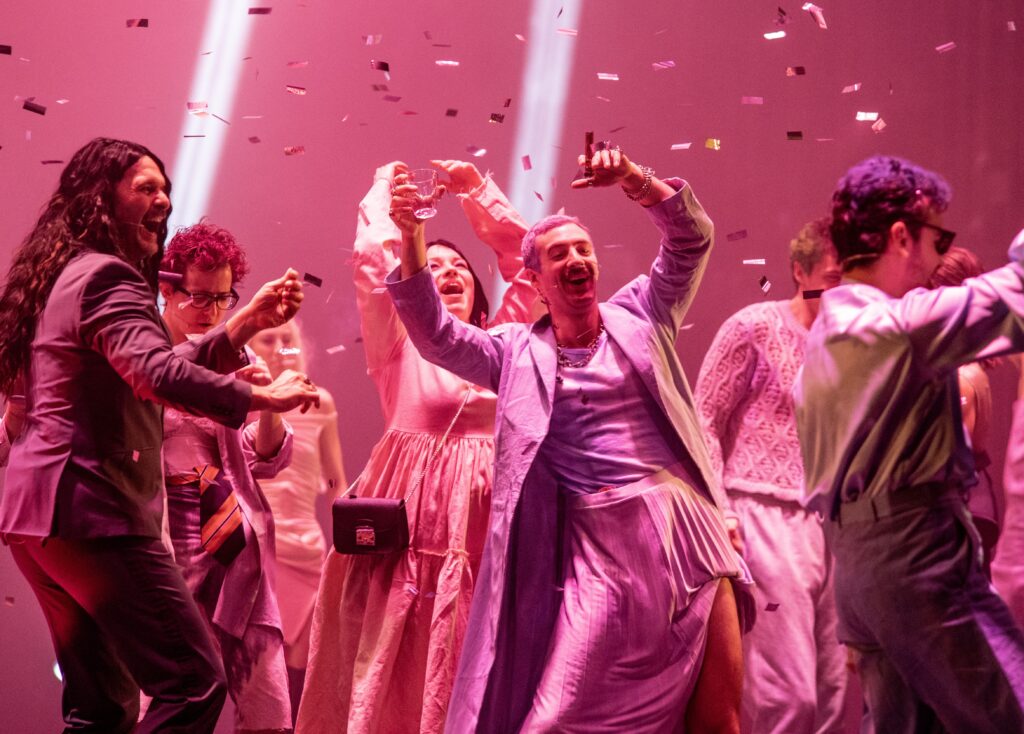National Theatre of Belgrade, premiere 14th March 2024
The comedies of Branislav Nušić are the most beloved in Serbian theatre. The traditions of vaudeville, character and situation comedy are anchored in his arsenal of humour and the first sentence of every programme note underscores the eternal relevance of his work.
He creates plots based on deception and confusion, moulds characters from the petit bourgeoisie, emphasising the discrepancy between their desires and abilities. These characters may be typical but there’s a sense the writer loves them. They usually survive whatever confusion they are plunged into without major consequences.
It has been noted more than once that Nušić’s social criticism relies so much on vaudeville elements and captivating characters that his comedy often ceases to be a means of criticism and becomes its own purpose. Both theatre artists and audiences often overlook this, which can create a fallacy that justifies easy laughter by reinforcing it with the idea of a political subversion that simply is not there.
This idealisation of Nušić often overrides a truly critical evaluation of his plays. Productions of his texts are rarely a place of artistic reflection, as a result the theatre of Branislav Nušić has become an expression of strong conventionality.
It is precisely for this reason that the announcement that famous Serbian director Miloš Lolić would be staging his comedy Mister Dolar at the National Theatre in Belgrade was met with great curiosity and high expectations. Not only because Lolić has built his career abroad and has a reputation here as a director who tends to deconstruct conventional interpretations of well-known plays, but also because, in his rare appearances on the Serbia scene, his work always surprises. Even before rehearsals had started, there was a feeling that we would be dealing with a different take on Nušić.
Mister Dolar is considered a less popular comedy due to its forced plot. The plot is driven by Matković, who has just been left by his love Nina, because she has found a better candidate for marry. The profit-driven meeting of the “elite” club becomes the target of Matković’s revenge. He exaggerates the waiter Jean’s inheritance. Instead of a hundred dollars, Matković tells everyone that the inheritance amounts to three million! The waiter suddenly becomes the most visible person in Belgrade, who everyone tries to get close to. The result is a an orchestration of sycophancy, self-interest, hypocrisy and shameless greed.
Apart from its structural weakness, this comedy also has an ideological problem. Although it points to the danger of class differentiation, it is not well executed. By denouncing the Belgrade moneyed elite, who see money primarily as a means of demonstrating social prestige and standing, Nušić consequently, without much attention, romanticizes poverty. Even when he becomes a millionaire, the naïve waiter Jean remains somewhat resistant to the corrupting influence of wealth and remains in love with the maid Marishka. True love is only possible under conditions of poverty, it seems.
Lolić’s reading of this play is indeed surprising. He stages this interwar comedy about the corrupting power of big capital and the insatiable greed of the elites as a rave party, a choice which, as it turns out, creates a series of confusions.
The concept presents us with a dilemma. As the loud rave music is at the centre of Lolić’s concept, it is difficult to understand what the actors are saying. It remains unclear whether the sound department struggled with technical difficulties or whether it was the director’s intention to emphasise the vanity and insignificance of the words exchanged between the elite.
The characters move around a mostly empty space, a dance floor on which stands a giant transparent pyramid, a reference to a dollar note and a sign that the people we see are at the “top of the social pyramid” because they enter the stage through an opening at the base of the pyramid. Again, the question arises as to why the director identifies the rave subculture with the richest strata of society, who dance unstoppably and carefree in this setting. Does he consider rave culture to be decadent and therefore equates it with the corruption of the rich, or did he simply want to create an atmosphere of uninterrupted partying in which the elite recklessly enjoy themselves and are oblivious to the problems of the world outside their ivory tower?

Mister Dolar at National Theatre Belgrade. Photos: Marko Krunic
Marija Marković Milojev’s costumes add another layer of uncertainty. In the first half of the piece, the wardrobe has a 1990s feel, dominated by tracksuits, jackets, large chain collars and hip bags designed to look luxurious. In the second half of the play, the style hastily and unmotivatedly shifts to a contemporary urban style. What remains inexplicable are the overlays of what one would traditionally identify with feminine details on the costumes of the male members of the ensemble, such as high-heeled boots or an off-the-shoulder dress, while on the female part of the ensemble there are no overlays of what we would traditionally associate with a masculine wardrobe. Although we can understand this as a provocation of the patriarchal system, the decision can also be read as a kind of reactionary feminism, as the piece addresses this issue in no other way – decadence and greed are characteristics of the weakening of masculine, patriarchal culture.
Lolić’s organisation of the ensemble follows the principles of ‘action groups’ formulated by Josip Kulundžić, the theatre director who was the first to stage Nušić’s late comedies, including Mister Dollar. An action group is a group of characters who “react collectively as one person, a kind of comedy of characters represented by a closed circle of psychologically unified persons”. In the atmosphere of the club, with loud music and actors shouting words in each other’s ears, the principle of the action group is taken to extremes – there are no significant differences between the characters. They all behave in the same way. They dance carelessly, they communicate disinterestedly, absent-mindedly, without enthusiasm. This is true even of the initiator of the plot, Matković, played by Radovan Vujović. He is a dispirited, almost depressive misanthrope with vengeful intentions, but without any energy or passion.
The updated setting leads to an anachronistic feel. Although the minimum wage in Serbia today is 45,000 dinars, the tavern in this production costs only 75,000 dinars. Although smartphones are used, people still write letters and take photos. Although they dance to the beats of techno music, the actors talk about how they dance the foxtrot.
Such discrepancies generate confusion, something which is only intensified by the implausibility of the denouement. When it turns out that the waiter Jean is not a millionaire, the only one who is materially harmed is Matković himself, who financed the entire revenge scheme. The other characters who flatter Jean are only offended because they fell for an unsavoury joke. What happened to them was a violation of reputation and honour, which at the time Nušić wrote his comedy went hand-in-hand with money. This raises an obvious question: Why are the ultra-rich ravers who are constantly dancing on stage so upset about the damage to their reputation and what constitutes their reputation in the first place? Why do these modern people for whom money is an ultimate value in itself, seem to take the news that they have been cheated even worse than the characters from the text? They brutally kick Matković out, which is not the case in Nušić’s play.
The innovations that Lolić comes up with in staging Nušić may communicate with the younger and middle generations, who are the main visitors to Belgrade theatres these days, but they do not offer a coherent commentary on the world in which these people live. On the contrary, this production presents us with an inarticulate postmodern jumble that does not make us think about the harsh world in which we live. The whole thing has the feel of an opportunity missed.
Credits:
Director; Miloš Lolić//Dramaturgy: Periša Perišić//Idea for scenography Miloš Lolić//Scenography realisation Miraš Vuksanović
Costusmes: Marija Marković Milojev// Music: Nevena Glušica //Choreography Irena Maksimovi
For more information visit: Narodnopozoriste.rs
Andrej Čanji is a theatre critic and theatrologist based in Belgrade.








